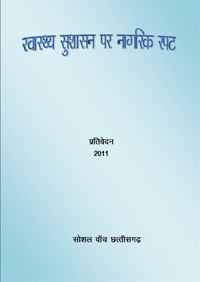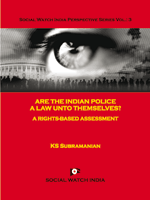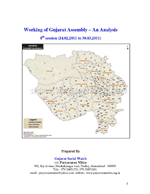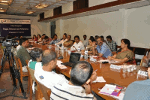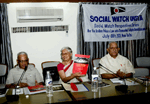India
Published on Tue, 2012-01-24 07:42
The people have been facing different kinds of deprivation and inequality in the Indian cities, according to a UNESCO study on the India urban policies reported by Governance Now analysis portal. “There are inequality, ghettoisation, apartheid and segregation across the cities in India,” said Miloon Kothari, former UN special rapporteur on adequate housing. |
| Published on Sun, 2011-12-11 23:00 |
Published on Sun, 2011-12-11 23:00
Social Watch India Perspective Series Vol. 3: A Rights-Based Assessment Social Watch India, 2011 |
Published on Sun, 2011-12-11 23:00
Working of Gujarat Assembly – An Analysis 8th session (24.02.2011 to 30.03.2011) |
|
The lack of long-term planning that has characterized India’s governments is seen clearly in its demographic growth and increasing CO2 emissions. The recently proposed “missions” (or sustainable development initiatives) are not only insufficient but their effectiveness, however minimal, remains uncertain. Recent amendments to the heavily criticized 1894 Land Acquisition Act are unclear and fail to address the problems in the legislation. The Government must fully support renewable energy sources and integrate climate risk management in development planning. If it does not, all future scenarios for the country will be murky.
|
Published on Mon, 2011-09-19 12:24
Sources: Social Watch India, Governance Now |
|
Source: . Published on Mon, 2011-09-12 12:27
Waxing eloquent in a heated television debate or appearing on the national news network is one thing, and being a good Parliamentarian is another. Unfortunately, most people do not even know the names of the best performing members of Parliament (MPs), some of whom don't even get re-elected at times. |
| Source: . Published on Sat, 2011-09-10 14:51 |
Published on Tue, 2011-07-19 07:20
Source: Social Watch India Most of the 70,000 complaints filed every year at the National Human Rights Commission of India “are against police”, said Dr. K. S.Subramanian, former policeman and author of the report “Social Watch India Perspective Series Vol.:3”, launched last week. |
|
Published on Fri, 2011-07-08 09:10
Source: The New Indian Express. The new figures set by the Indian government to define poverty (an income of USD 0.45 a day for urban people and one of 0.33 for those living in rural areas) are “abysmally low”, wrote Himanshu Jha, the national coordinator of Social Watch India, in his most recent column for The New Indian Express, one of the major newspapers of his country. The politics fixed according to these indicators can exclude “a large section of the population” that needs aid from “the available social security net, which in this country is minimalist by any standard,” he warned. Jha’s column reads as follows: |
SUSCRIBE TO OUR NEWSLETTER


